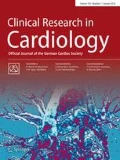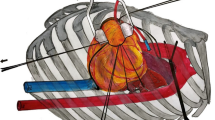Summary
The value of minimally invasive techniques in relation to conventional coronary surgery is not clearly established and frequently very controversially discussed.
Among the different minimally invasive procedures, the MIDCAB (minimally invasive direct coronary artery bypass) represents the most commonly applied technique. Accordingly, revascularization of anterior myocardial vessels is performed via a minithoracothomy on the beating heart with a left IMA graft. Since 6/96, 306 patients in part with a significant degree of comorbidity or more complex cardiac findings received MIDCAB grafting.
Primarily all patients survived the procedure with stabile hemodynamics. However, subsequently 4 patients later died to cardiac (n=2) or noncardiac reasons (n=2). Beyond that, no other patient developed a myocardial infarction. Conversion to conventional techniques became necessary in 3 cases. Control angiographies revealed global patency rates of 98.3%. In addition, 4 malinsertion of the LIMA to diagonal branches were observed.
MIDCAB grafting of anterior myocardial vessels appeared effective and safe. Especially for patients facing a high risk in conventional coronary surgery or with nonsatisfying interventional results, this approach might be superior.
Zusammenfassung
Der Stellenwert minimalinvasiver Operationsverfahren in Relation zum konventionellen Koronareingriff ist bisher nicht definiert und wird ausgesprochen kontrovers beurteilt.
Unter verschiedenen Verfahren hat die MIDCAB-(minimally invasive direct coronary artery bypass) Technik bisher die weiteste Verbreitung erreicht. Dabei erfolgt die Anlage eines singulären Mammaria-Bypasses üblicherweise zu myokardialen Vorderwandgefäßen am schlagenden Herzen über eine anteriore Minithorakotomie. Seit 6/96 erhielten 306 Patienten mit teilweise erheblicher Komorbidität und komplexeren kardialen Befunden eine MIBCAB-Revaskularisation.
Nachdem primär alle Patienten den Eingriff kreislaufstabil überstanden, verstarben im weiteren Verlauf 4 Patienten an kardialen (n=2) bzw. nicht-kardialen Komplikationen (n=2). Darüber hinaus entwickelte kein weiterer Patient einen Myokardinfarkt. Konversionen zu einer konventionellen Operationstechnik wurden bei 3 Fällen notwendig. Die angiographische Kontrolle des Operationsergebnisses zeigte eine Offenheitsrate von 98,3%. Jedoch wurden auch 4 Fehlinsertionen an Diagonalästen beobachtet.
Die MIDCAB-Technik scheint eine effektive und komplikationsarme Revaskularisation der myokardialen Vorderwand zu gestatten. Insbesondere bei Risikopatienten und nach unbefriedigender interventioneller Therapie verdient dieses Verfahren besondere Beachtung.
Similar content being viewed by others
Author information
Authors and Affiliations
Additional information
Rights and permissions
About this article
Cite this article
Cremer, J., Wittwer, T., Böning, A. et al. Minimalinvasive Revaskularisation der Vorderwand mittels Mammaria-Bypass am schlagenden Herzen. Z Kardiol 88 (Suppl 4), S002–S009 (1999). https://doi.org/10.1007/s003920050574
Issue Date:
DOI: https://doi.org/10.1007/s003920050574




